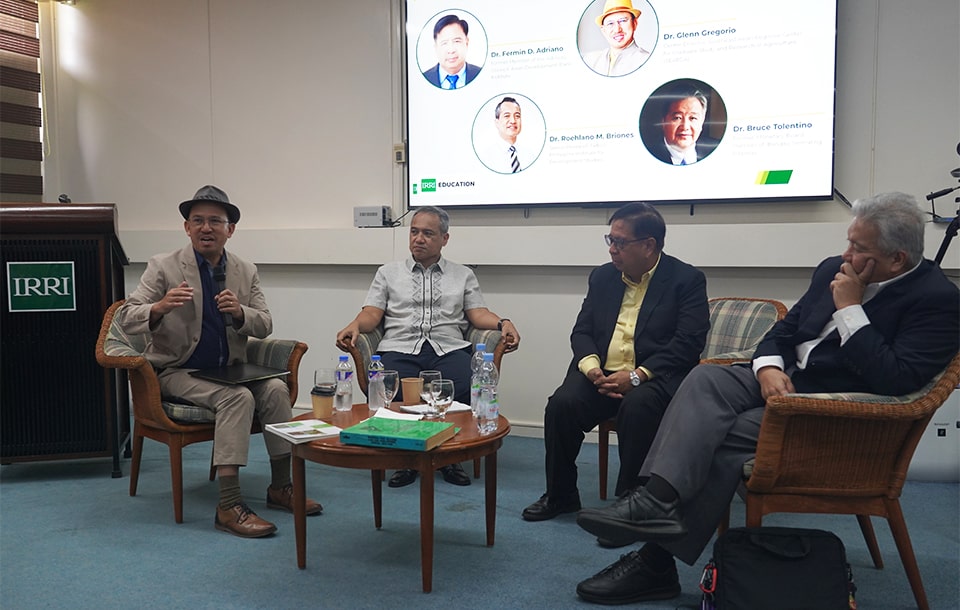
LOS BAÑOS, Philippines— Dr. Glenn Gregorio, Center Director of the Southeast Asian Regional Center for Graduate Study and Research in Agriculture (SEARCA), participated as a speaker in the panel discussion on "Rice Trade Liberalization and Improving the Competitiveness of the Philippine Rice Sector" held on 11 September 2024 at the International Rice Research Institute (IRRI). The event was part of the three-day Training Workshop on Self-sufficiency, Food Security, and Agricultural Transformation implemented by IRRI Education.
Dr. Gregorio provided an in-depth analysis of the Rice Tariffication Law and its impacts on the Philippine rice industry. He explained how the law replaced quantitative import restrictions with tariffs to enhance the competitiveness of local rice farmers. Additionally, Dr. Gregorio emphasized the need for the full implementation of the Philippine Rice Industry Roadmap 2030, which aims for a "rice-secure Philippines" by ensuring rice is available, affordable, accessible, safe, and nutritious for all Filipinos. The roadmap focuses on improving competitiveness, enhancing resiliency to disasters and climate risks, and guaranteeing the availability of safe and nutritious rice.
He also highlighted the significance of the Rice Competitive Enhancement Fund (RCEF), which supports the Philippine Department of Agriculture's (DA) National Rice Program. RCEF focuses on four key areas: rice farm mechanization, inbred rice seed development and promotion, expanded rice credit assistance, and rice extension services.
Dr. Gregorio stressed the crucial role of innovation in driving transformational change within the rice sector. He explained that innovation is critical in several areas, including policy innovation, which involves creating more inclusive services, identifying new funding sources, and implementing supportive policies. Institutional innovation is also necessary for improving governance and building stronger partnerships. In addition, social innovation plays a key role in addressing community needs and driving development. Furthermore, technological innovation is essential for scaling solutions and enhancing education, while conceptual innovation introduces new ways of thinking and working that improve governance and organizational effectiveness.
Other panelists included Dr. Roehlano Briones, Senior Research Fellow at the Philippine Institute for Development Studies; Dr. Fermin Adriano, former member of the Advisory Council at the Asian Development Bank Institute; and Dr. Bruce Tolentino, former Monetary Board Member at Bangko Sentral ng Pilipinas. Dr. Valerien Pede, Head of IRRI's Transformative Policies and Investments Unit, Department of Sustainable Impact through Rice-based systems, served as moderator.
During the panel discussion, the panelists were asked to discuss the advantages and disadvantages of the Rice Tariffication Law, its potential amendments, and the role of researchers in supporting its effective implementation.
Dr. Briones noted that the law is "pro-consumer" and that, for many years, restrictive import policies had driven up the retail price of rice. He said that when import restrictions were lifted, prices fell. However, he also acknowledged that while the reform lowered rice prices, it reduced the income of rice farmers. Rather than scrapping the law, Dr. Briones advocated for enhancing industry competitiveness and reducing the cost of rice production to help Filipino farmers compete with those in Thailand, Vietnam, and other major rice-exporting countries.
Dr. Tolentino emphasized the need for broader participation in rice importation, currently limited to a select group of private traders. He called for greater competition among traders to promote a more democratic and competitive market.
"We need to democratize the way our trade operates by allowing more traders to participate and compete," Dr. Tolentino said.
Meanwhile, Dr. Adriano highlighted the importance of fully understanding and appreciating the reform. He pointed out that enacting reforms without the confidence of implementers is a significant challenge.
In his closing remarks, Dr. Gregorio emphasized the importance of research and development, particularly the creation of new climate-smart rice varieties to boost productivity and competitiveness under the Rice Tariffication Law.
Held from 10–12 September 2024, the training workshop addressed critical issues related to food security, food self-sufficiency, and the challenges of agricultural pricing policies. The workshop reviewed various policy approaches, assessing their strengths and weaknesses, while also examining the role of agriculture in poverty reduction and combating malnutrition. Twenty-three researchers and policy influencers from IRRI, DA, DA-Philippine Rice Research Institute, the Philippine Department of Finance, Caraga State University, and the International Maize and Wheat Improvement Center participated in the event.